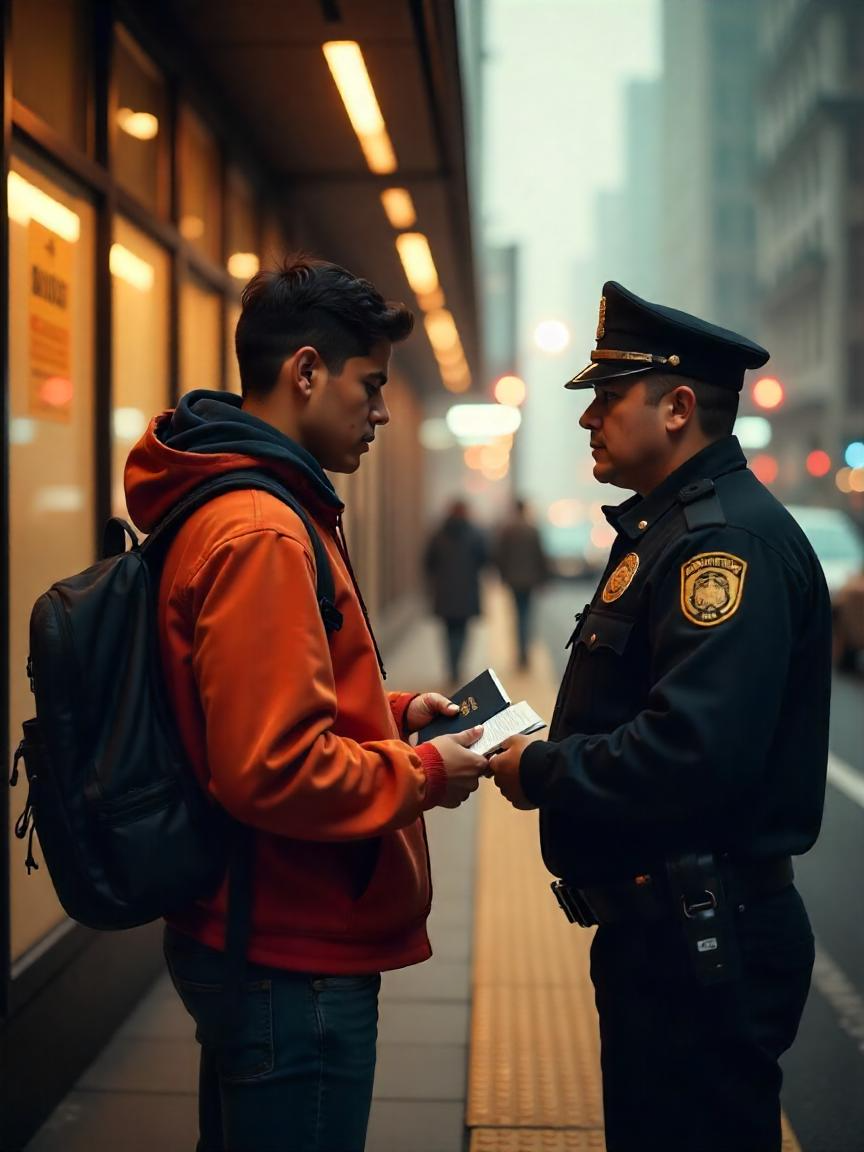
Steps to Renew Your Green Card
Renewing a green card is a process of extending the validity of a permanent resident card for lawful permanent residents who wish to continue residing in the United States. A green card owner is a lawful permanent resident of the United States of America and an identification of yourself, which proves that you have the right to legally live and work anywhere in the U.S. This green card has a life span of 10years before it expires and you are to renew it within the next six months or when it has reached its expiry date.
This guide explains the green card renewal process, including processing times, fees, and step-by-step instructions.
As a Lawful Permanent Resident, you can renew your green card yourself, but it is adivsable to let a professional immigration attorney take the stress off you and also, you will be sure it is done correctly without mistakes.
If you do choose to renew your green card yourself, the easiest method is usually renewing online using the U.S. Citizenship and Immigration Services (USCIS) online portal. When you renew your green card online, you can see when USCIS receives your application and get updates on its status.
Eligibility for Green Card Renewal
Not all green card holders are eligible for green card renewals. To be eligible, you must meet the following criteria:
- Your green card is expired or will expire within six months
- You are a permanent resident with a ten-year green card
- You have not been outside of the United States for more than one year since receiving your green card
If you do not meet these criteria, you may need to apply for a replacement green card instead. It is important to consult with an experienced immigration lawyer to determine the best course of action for your specific situation.
Requirements for Green Card Renewal
- Your current green card
- Proof of residency
- Personal identification documents
Green Card Renewal Processing Time
The processing time for renewing a green card is usually between 7 to 12 months from the date of filing Form I-90. However, there maybe be some delays which may happen due to:
* Additional security checks
* High volume of applications at USCIS
* Incomplete application submissions
Expedited Processing
If you need to renew urgently due to an emergency, financial hardship, or humanitarian reasons, you may request expedited processing. Supporting documentation is required. If approved, your application will be processed significantly faster.
Green Card Renewal Fees
Fees may change at anytime, so it is advisable to always check the USCIS website for the latest fees updates. If you are facing financial hardship, you may qualify for a fee waiver.
You are to make payments for:
* Application fee
* E-file fee
* Biometrics fee
Step-By-Step Guide to Renewing Your Green Card as a Legal Permanent Resident
Step 1: Sign into your USCIS Account
To renew your green card as a LPR, you must have an account with USCIS. Then sign into your account, using your email address and password to log in.
Note: Every member of your family will have their own account, even your minor children.
Step 2: Submit Form I-90
To start the renewal process, submit Form I-90 (Application to Replace Permanent Residence Card) with USCIS, Form I-90 is available online. You will need to fill it out entirely. You can file the form either online or by mail, which requires you to submit a photocopy of your current or expired green card, as well as pay your fees.
File Online
Create an account on the USCIS website, complete Form I-90, upload necessary documents, and pay the fees. Filing online allows you to track your application status and receive updates directly.
File via Mail
Download Form I-90 from the USCIS website, complete it, and mail it along with the required documents and payment to the address listed on the form.
Step 3: Receipt Receive Notification
After USCIS receives your Form I-90, you will get a receipt notice within 1 to 3 weeks. This notice includes a unique receipt number for tracking your case online.
Step 4: Biometrics Appointment Notice
USCIS will schedule a biometrics appointment within 4 to 6 weeks of receiving your application. You will receive an appointment notice with the date, time, and location.
Step 5: Attend Biometrics Appointment
The biometrics appointment is typically scheduled 2 weeks after receiving the appointment notice. Bring your appointment notice and a valid ID. Your fingerprints and photo will be taken.
Step 6: Receive Your New Green Card
Once biometrics are completed, USCIS will continue processing your renewal. Your new green card should arrive within 7 to 11 months from the date of filing.
When to Renew Your Green Card
Failing to renew your green card won’t cost you your lawful permanent resident status—but an expired card has no practical use. You can’t use it to prove your legal status in the U.S., nor can you present it for employment, travel, or other official purposes. That’s why it’s essential to keep your green card valid at all times.
It’s best to start the renewal process about six months before your card expires. If you’ll be outside the U.S. during that period, consider applying even earlier. An experienced Austin immigration attorney can handle the renewal process for you—preparing and filing Form I-90 (Application to Replace Permanent Resident Card)—so you can stay focused on what matters most.
Special Cases for Green Card Renewal
Applying for a fee waiver: Must file Form I-90 by mail.
Expired green card while traveling abroad: Contact the nearest U.S. consulate, USCIS international office, or U.S. port of entry before filing Form I-90.
2-year conditional green card: Follow a different process for conditional green card holders.
While your lawful permanent resident status does not expire, your green card does. Once you’ve been granted permanent residency in the U.S., you maintain that status as long as you follow the rules.
However, green cards are issued in 10-year increments. This is partly because your appearance may change over time, and physical cards can become worn or damaged.
If your green card has expired, you cannot use it for employment, international travel, or to verify your identity. That’s why it’s necessary to renew your green card every ten years by applying for a replacement.
How to Check Your Green Card Renewal Status
You can check your renewal status on the USCIS Case Status Online page by entering your receipt number. Creating a USCIS account allows you to receive case notifications.
What to Do If Your Green Card Renewal is Denied
If USCIS denies your renewal, you will receive a notice explaining the reason. You may be able to appeal or file a motion to reopen or reconsider the decision.
Frequently Asked Questions
Why is my green card renewal taking so long?
Processing delays can occur due to a high volume of applications, additional background checks, or incomplete applications. Ensure all documents are correctly submitted to avoid delays.
Can You Renew Your Green Card When You’re Outside the United States?
You can renew your green card if you’re outside the United States, although it may be better to file for renewal early. Naturally, you can’t do that if your travel was unexpected – but, if possible, you should renew your green card while you’re at home. If you’re outside the U.S. when your card expires, you’ll need to contact the nearest U.S. consulate in your area before you file your renewal form.
Can You Renew a Conditional Green Card?
If your green card has conditions attached to it – as is typically the case with marriage-based green cards – you can’t simply renew your card. You must petition the U.S. government to remove the conditions on your green card. If the government grants your petition, you’ll be issued a brand-new 10-year green card, which you won’t have to renew for another 9 years and 6 months.
What if my green card expires while waiting for renewal?
You are still a lawful permanent resident, but some activities, such as traveling or employment verification, may be challenging. Use your USCIS receipt notice (Form I-797) as proof of pending renewal. When you apply to renew within 12 months of an expiring Green Card, you will receive an I-797 that extends your status for an additional 12 months.
Can the U.S. Government Deny a Green Card Renewal?
The U.S. government can deny your petition to renew your green card; however, that doesn’t necessarily mean you’re deportable – or that you’re in danger of losing your lawful permanent resident status. In some cases, a denial is simply due to an administrative error.
There are cases in which the government will deny a person a green card renewal because that person is in danger of losing his or her permanent residency.
You can lose your permanent residency by:
* Committing a certain type of crime or a series of crimes
* Voting or attempting to vote as a U.S. citizen
* Failing to complete a timely change of address form with USCIS when you move to a new home
* Failing to establish a permanent residence in the U.S.
* Abandoning your permanent residence in the U.S.
* Committing fraud during the application process (either for the original visa that brought you to the United States or for your green card)
Can I travel while waiting for my green card renewal?
Yes, you can travel, but you must carry your expired green card and Form I-797 to re-enter the U.S. These documents confirm your lawful status
Are There Versions of the Green Card That Are No Longer Valid?
Previous versions of alien registration cards, such as USCIS Form AR-3, Form AR-103 and Form I-151, are no longer valid. You must replace them with a current green card.
Get Trusted Legal Help from Mokolo Law Firm
Going through the immigration process can be overwhelming, especially with strict requirements and the risk of delays from even small errors. Whether you’re renewing a green card, adjusting your status, or applying for lawful permanent residency, having the right legal guidance makes all the difference.
At Mokolo Law Firm, we focus exclusively on immigration law. Our experienced attorneys are well versed in the application process and are committed to helping clients avoid costly mistakes and unnecessary stress. Let us handle the paperwork while you focus on your future. Contact Mokolo Law Firm today to learn how we can assist you and your loved ones on your immigration journey.

What To Do If The Police Ask About Your Immigration Status in Houston, Texas
Having an encounter with the police can be a nerve-wracking experience for both immigrants and non-immigrants. If you’re an immigrant or have unresolved immigration issues, it can make the situation even more complex. By knowing your rights and understanding how to handle these encounters, you can better protect yourself and ensure a safer experience. In this blog, we will discuss what to do if the police ask about your immigration status in Houston, Texas.
Tensions can run high when dealing with police officers, and the way you respond is very important. Neither you nor the officer knows how the encounter might end. Depending on your immigration status, the outcome could have serious consequences. Therefore, it is crucial to remain calm and think carefully before responding, in order to avoid any negative impact on your immigration process.
U.S. immigration law is enforced by federal agencies such as Immigration and Customs Enforcement (ICE), United States Citizenship and Immigration Services (USCIS), and Customs and Border Protection (CBP). State and local police officers generally do not have the authority to enforce federal immigration laws; it is not part of their official duties.
However, in 2017, a law known as Senate Bill 4 (SB4) was passed, granting Texas law enforcement officers the authority to inquire about an individual’s immigration status during lawful detentions or arrests. Texas is one of the few states to have implemented this law.
Read This: How To Apply For USA Citizenship in Houston Texas

Here Are What To Do If The Police Ask About Your Immigration Status in Houston, Texas
1. Know and Understand Your Rights
The first step in handling a police encounter is to know and understand your rights. Regardless of your immigration status, certain fundamental rights are protected under the U.S. Constitution. These include:
- The right to remain silent: Protected by the Fifth Amendment, this right allows you to refuse to answer questions about your birthplace, citizenship status, place of residence, or any other information that could incriminate you.
- The right to refuse consent to a search: The police may only search your home or property if they have a valid search warrant signed by a judge. If they do not, you can politely ask them to leave.
- The right to an attorney: If you face any legal issues as an undocumented immigrant, you have the right to be represented by an attorney.
You are not obligated to disclose your immigration status unless you are being detained by immigration authorities.
2. Be Calm and Polite
It is important to remain calm and respectful during any interaction with the police. Cooperate without volunteering unnecessary information. Avoid arguing, making sudden movements, or acting suspiciously. Reaching for items without permission may be perceived as threatening behavior and could escalate the situation.
Remember, being polite does not mean surrendering your rights. You can assert your rights respectfully.
3. Be Very Observant and Watchful
In some cases, police officers may act outside the scope of the law. If you are arrested or detained without just cause, it’s essential to gather as much evidence as possible. Be proactive in noting the officers’ names, badge numbers, the time, and location of the encounter.
If safe to do so, take photos, record videos, or make audio recordings of the interaction. This documentation could support your case if you need to file a complaint or seek legal assistance later.
4. Don’t Lie – Be Truthful
If you’re an undocumented immigrant, never provide false information to law enforcement officers. Doing so can have serious legal consequences. If you prefer not to answer a question, simply state, “I choose to remain silent.”
Only immigration officers have the legal authority to demand your immigration documents. If requested and you have them on you, present them.
If you do choose to answer questions, be truthful. Providing false information or misrepresenting yourself can lead to criminal charges and negatively impact your immigration process. Misrepresenting yourself as a U.S. citizen, for example, can make you permanently ineligible for citizenship and result in removal (deportation) proceedings.
5. Present Your Documents
When stopped by the police, you may be asked for identification. If you are an immigrant aged 18 or older and have legal status, you should always carry your immigration papers—this may include your passport, green card, Adjustment of Status documents, or any document with your Alien Registration Number.
If you are a U.S. citizen, you do not need to carry immigration documents. A state-issued driver’s license will usually suffice as proof of legal residence.
6. Know Your Local Policies
Local enforcement of immigration laws can vary. It’s important to familiarize yourself with the local policies in your area. Know the laws regarding traffic stops, local cooperation with ICE, and other relevant immigration practices. Understanding your community’s specific policies can help you navigate encounters with law enforcement more confidently.
When to Exercise Your Right to an Attorney
If a police officer searches your property without a warrant, questions your immigration status unlawfully, or detains you without cause, you should request to speak to an attorney immediately.
Having legal representation ensures your rights are protected, prevents misuse of authority, and provides access to accurate legal guidance. A competent immigration attorney can speak on your behalf, advocate for your case, and work to protect your stay in the U.S.
Even if you cannot afford an attorney, you can request that one be appointed at no cost. U.S. law ensures everyone has fair access to legal representation, regardless of immigration status.
You should seek legal counsel if:
- You are arrested as an immigrant and it may jeopardize your stay in the U.S.
- You chose to remain silent when asked about your immigration status.
- Your rights were violated by the police during the encounter.
- You are facing deportation and your case has been referred to an immigration judge.
Note:
If you were assigned an attorney and you are not confident in their ability to represent you, you are entitled to seek a different attorney. If a previous attorney’s mistakes negatively impacted your case, you may be eligible to resubmit your application with the help of competent legal counsel.
@legallyuzo Don't do these things if you want to be a US citizen. 1. rovide false information or commit fraud during the immigration process 2. Failure to pay taxes or failure to file income tax 3. Sectons criminal convictions, especial felonies, can impact your Hability for citizenship Visit: https://www.mokololaw.com/practice/immigration-law/
♬ original sound – Legallyuzo
Lastly On What To Do If The Police Ask About Your Immigration Status in Houston, Texas
Encounters with law enforcement can be stressful, especially when questions about your immigration status are involved. It is wise to consult with an immigration attorney to ensure you receive accurate legal advice tailored to your specific situation. Having the right legal representative by your side can make all the difference between staying in the U.S. or facing deportation.
Find Immigration Experts to Protect Your Rights
Contact the Skilled Immigration Lawyers at Mokolo Law Firm.
Our experienced immigration attorneys can speak on your behalf, help you avoid costly mistakes, and protect you from deportation. We understand how quickly things can escalate for undocumented immigrants during law enforcement encounters. Let us guide and represent you through the legal process and fight for the best outcome possible.

How To Apply For USA Citizenship in Houston Texas
So many legal and permanent immigrants residing in the U.S.A. have a desire to fulfil “The American Dream”. Such a dream can never be fulfilled without being a citizen of the country. Being a lawful permanent resident, you could be lucky to be eligible to become a U.S. citizen through naturalization. However, getting citizenship is a big mountain to climb, and you will need the help of an experienced immigration attorney and also have the proper understanding of the naturalization process.
How To Apply For USA Citizenship in Houston Texas
What Is Citizenship?
Citizenship is a legal status and relation between an individual and a state, granting rights and responsibilities. This status can be acquired through birth by U.S citizen parents, naturalization, or other means, such as declaration or inheritance. It is similar to naturalization. It has so many benefits and responsibilities that are beneficial to an individual. Its responsibilities are obeying laws, paying taxes, and serving on juries.
Benefits of U.S. Citizenship
- The right to remain in the United States as a United States Citizen
- Eligibility for a U.S. passport to travel internationally
- Work without restrictions
- The right to vote, hold elected public office, and apply for certain federal and state jobs
- Avoiding green card renewal fees
- Receive protection from the government
- -The advantage of bringing in family members to the United States
- The opportunity for citizenship for your LPR children under 18 years of age.
What Is Naturalization?
Unlike citizenship, naturalization is the legal process through which one acquires the nationality or citizenship of another country. It’s a remarkable way for immigrants who want to become well-recognized citizens of their new nation. The ultimate goal of naturalization is to grant individuals the same rights and responsibilities as those with natural-born citizenship, allowing them to fully participate in the country’s social, economic, and political life.

How To Apply For USA Citizenship in Houston Texas Through the Naturalization Process
Before you can become a citizen, you need to apply and go through the naturalization process. Applying for U.S. citizenship in Houston, Texas, is a well-structured and long process that involves several key steps. And the steps are:
1. Eligibility
Before applying for citizenship, you need to determine your eligibility for naturalization and make sure you meet the compulsory criteria (unless they qualify for an exemption or apply based on their U.S. military service). While some criteria are straightforward, others take some planning. To be eligible for naturalization, you must:
- Be of the minimum required age (typically, at least 18)
- Continuously and physically live in the United States as a green card holder for a certain number of years
- Establish residency in the state or U.S. Citizenship and Immigration Services (USCIS) district where they intend to apply
- Have “good moral character”
- Be proficient in basic spoken and written English and demonstrate knowledge of U.S. history and government
- Register for military service (if a male of a certain age) and be willing to perform civil service when required-Register for military service (if a male of a certain age) and be willing to perform civil service when required
- Swear allegiance to the United States
2. Prepare and Submit Form N-400
The Form N-400 is the official document to apply for U.S. citizenship, which is known as the Application for Naturalization. When filling this out, ensure you include the necessary documentation and the filing fee and the biometric services fee. And take note that free waivers are available for eligible applicants. The process to fill this form is:
- Applicant will create a free account and file online through the USCIS website.
- Or mail the completed form to the appropriate address listed on the USCIS direct filing addresses page.
3. Biometrics Appointment
After submitting your application, a biometrics appointment will be scheduled by USCIS at a local Application Support Center (ASC). At this stage, your personal information will be collected for the background check. Information like your fingerprints, photograph, and signature.
4. Interview and Tests
USCIS will send you a notification of a scheduled date and location of your naturalization interview, usually at the Houston Field Office. At the interview, a USCIS officer will review your N-400 application, you will be tested on the English language, which includes reading, writing, and speaking components, and you will also take the civics test, covering U.S. history and government.
5. USCIS Decision
After the interview, USCIS will provide a written notice decision of your interview. The decision could be: your application is approved, additional documentation is needed, you need to retake the tests, or your application is denied.
6. Attend the Oath Ceremony
After approval, a naturalization ceremony will be scheduled, where you will take the Oath of Allegiance to the U.S. A. This is the final step in becoming a U.S. citizen, and you will receive your Certificate of Naturalization.
Denied Citizenship Application
Sometimes, after the application submission and the interview process is completed, it’s still possible to get a denial response from USCIS. Even if you met all the eligibility requirements, here are some of the most common reasons citizenship applications get denied:
- Missing documents or incomplete forms
- Having a criminal record
- Failing the language proficiency or civic knowledge tests
- Providing false information or misrepresenting facts on your application
@legallyuzo Don’t do these things if you want to be a US citizen. 1. rovide false information or commit fraud during the immigration process 2. Failure to pay taxes or failure to file income tax 3. Sectons criminal convictions, especial felonies, can impact your Hability for citizenship Visit: https://www.mokololaw.com/practice/immigration-law/
♬ original sound – Legallyuzo – Legallyuzo
Final Words On How To Apply For USA Citizenship in Houston Texas
If you’re ready to take the next step to become a naturalized citizen, contact a reputable Houston immigration and naturalization attorney for a consultation. At Mokolo Law Firm, we counsel each client about what to expect during the naturalization process, and answer all questions and concerns along the way.
Our goal is to provide legal guidance to permanent residents who apply for citizenship through the USCIS naturalization process, educate them to understand all the rights and responsibilities that come with citizenship and finally to help them become U.S. citizens to fulfill their American Dream.

President Biden’s Executive Orders Affecting Immigration
President Biden’s Executive Orders on Immigration

U.S. Citizenship Through Naturalization
A guide to obtaining your US Citizenship through the Naturalization process

DACA
DACA has been reinstated. New applicants are eligible to apply again! Check out K&M’s lastest blog post and see if you qualify.



